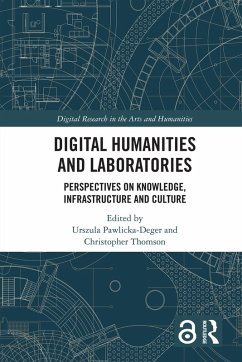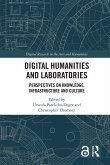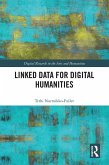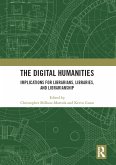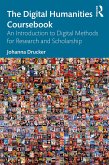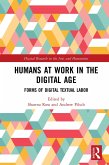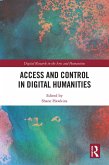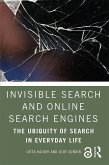Digital Humanities and Laboratories (eBook, PDF)
Perspectives on Knowledge, Infrastructure and Culture
Redaktion: Pawlicka-Deger, Urszula; Thomson, Christopher
41,95 €
41,95 €
inkl. MwSt.
Sofort per Download lieferbar

21 °P sammeln
41,95 €
Als Download kaufen

41,95 €
inkl. MwSt.
Sofort per Download lieferbar

21 °P sammeln
Jetzt verschenken
Alle Infos zum eBook verschenken
41,95 €
inkl. MwSt.
Sofort per Download lieferbar
Alle Infos zum eBook verschenken

21 °P sammeln
Digital Humanities and Laboratories (eBook, PDF)
Perspectives on Knowledge, Infrastructure and Culture
Redaktion: Pawlicka-Deger, Urszula; Thomson, Christopher
- Format: PDF
- Merkliste
- Auf die Merkliste
- Bewerten Bewerten
- Teilen
- Produkt teilen
- Produkterinnerung
- Produkterinnerung

Bitte loggen Sie sich zunächst in Ihr Kundenkonto ein oder registrieren Sie sich bei
bücher.de, um das eBook-Abo tolino select nutzen zu können.
Hier können Sie sich einloggen
Hier können Sie sich einloggen
Sie sind bereits eingeloggt. Klicken Sie auf 2. tolino select Abo, um fortzufahren.

Bitte loggen Sie sich zunächst in Ihr Kundenkonto ein oder registrieren Sie sich bei bücher.de, um das eBook-Abo tolino select nutzen zu können.
Digital Humanities and Laboratories explores laboratories dedicated to the study of digital humanities (DH) in a global context and contributes to the expanding body of knowledge about situated DH knowledge production.
- Geräte: PC
- mit Kopierschutz
- eBook Hilfe
Andere Kunden interessierten sich auch für
![Digital Humanities and Laboratories (eBook, ePUB) Digital Humanities and Laboratories (eBook, ePUB)]() Digital Humanities and Laboratories (eBook, ePUB)41,95 €
Digital Humanities and Laboratories (eBook, ePUB)41,95 €![Linked Data for Digital Humanities (eBook, PDF) Linked Data for Digital Humanities (eBook, PDF)]() Terhi Nurmikko-FullerLinked Data for Digital Humanities (eBook, PDF)41,95 €
Terhi Nurmikko-FullerLinked Data for Digital Humanities (eBook, PDF)41,95 €![The Digital Humanities (eBook, PDF) The Digital Humanities (eBook, PDF)]() The Digital Humanities (eBook, PDF)43,95 €
The Digital Humanities (eBook, PDF)43,95 €![The Digital Humanities Coursebook (eBook, PDF) The Digital Humanities Coursebook (eBook, PDF)]() Johanna DruckerThe Digital Humanities Coursebook (eBook, PDF)39,95 €
Johanna DruckerThe Digital Humanities Coursebook (eBook, PDF)39,95 €![Humans at Work in the Digital Age (eBook, PDF) Humans at Work in the Digital Age (eBook, PDF)]() Humans at Work in the Digital Age (eBook, PDF)43,95 €
Humans at Work in the Digital Age (eBook, PDF)43,95 €![Access and Control in Digital Humanities (eBook, PDF) Access and Control in Digital Humanities (eBook, PDF)]() Access and Control in Digital Humanities (eBook, PDF)40,95 €
Access and Control in Digital Humanities (eBook, PDF)40,95 €![Invisible Search and Online Search Engines (eBook, PDF) Invisible Search and Online Search Engines (eBook, PDF)]() Jutta HaiderInvisible Search and Online Search Engines (eBook, PDF)0,00 €
Jutta HaiderInvisible Search and Online Search Engines (eBook, PDF)0,00 €-
-
-
Digital Humanities and Laboratories explores laboratories dedicated to the study of digital humanities (DH) in a global context and contributes to the expanding body of knowledge about situated DH knowledge production.
Dieser Download kann aus rechtlichen Gründen nur mit Rechnungsadresse in A, B, BG, CY, CZ, D, DK, EW, E, FIN, F, GR, HR, H, IRL, I, LT, L, LR, M, NL, PL, P, R, S, SLO, SK ausgeliefert werden.
Produktdetails
- Produktdetails
- Verlag: Taylor & Francis eBooks
- Seitenzahl: 310
- Erscheinungstermin: 9. November 2023
- Englisch
- ISBN-13: 9781003817772
- Artikelnr.: 69237041
- Verlag: Taylor & Francis eBooks
- Seitenzahl: 310
- Erscheinungstermin: 9. November 2023
- Englisch
- ISBN-13: 9781003817772
- Artikelnr.: 69237041
- Herstellerkennzeichnung Die Herstellerinformationen sind derzeit nicht verfügbar.
Urszula Pawlicka-Deger is a Marie Curie Research Fellow at King's Digital Lab, King's College London. She is conducting an ethnography of digital humanities laboratories combined with a critical analysis of infrastructure. She was a postdoctoral researcher at Aalto University, a Fulbright scholar at Washington State University Vancouver, and a fellow at the University of Birmingham. Christopher Thomson is a Senior Lecturer in Digital Humanities at the University of Canterbury, Aotearoa/New Zealand where he researches and teaches on digital methods in humanities research, and is currently the director of the UC Arts Digital Lab. He is part of the team that produced the CEISMIC Canterbury Earthquakes Digital Archive, and has published on post-disaster archiving. He teaches and supervises students in literary studies, communications and data science.
Foreword; The Promise of Laboratories: An Introduction to Digital Humanities Laboratories in the 21st Century; Part 1: Epistemological and Philosophical Perspectives; 1. A Nurturing Lab Model for Computational Literary Studies: An Inside Perspective from the BGU Literary Lab; 2. Are We There Yet? How a Lab Transformed from Traditional History of Science to a Computational Research Lab; 3. Droit de cité: The Digital Lab as Digital Milieu; 4. How to Avoid Being a DH Lab: The Stories of the Sussex Humanities Lab; Part 2: Socio-Technical and Infrastructural Approaches; 5. More Than a Lab: Infra-structuring the Humanities in the Digital Studio; 6. The Life of a Digital Humanities Lab; 7. Initiating and Sustaining a Digital Humanities Laboratory in Nigeria; 8. Theory by Other Means? Prototypes in Digital Humanities Laboratories; Part 3: Collaborations; 9. Knowledge Transfer in Digital Humanities Labs: Laboratory of Innovation in Digital Humanities (LINHD-UNED);10. Exploring dHeKalos: A Digital Heritage Lab for Building Up New Skills and Sharing Responsibilities with Cultural Institutions; 11. The Minimum Research Outcome: A Mechanism for Generating and Managing Projects in Labs; Part 4: Socio-Cultural Approaches; 12. Interdisciplinary Technology Communities: Using Feminist Epistemologies and Pedagogy in a DH Lab to Promote Social Good through Undergraduate Student Programming; 13. At Home in the Digital Humanities?; 14. Digital Humanities Laboratories and its Discontents: Experiments and Perspectives from India; 15. Digital Humanities Labs: Spaces for Innovation to Reconnect the Humanities with Society
Foreword; The Promise of Laboratories: An Introduction to Digital Humanities Laboratories in the 21st Century; Part 1: Epistemological and Philosophical Perspectives; 1. A Nurturing Lab Model for Computational Literary Studies: An Inside Perspective from the BGU Literary Lab; 2. Are We There Yet? How a Lab Transformed from Traditional History of Science to a Computational Research Lab; 3. Droit de cité: The Digital Lab as Digital Milieu; 4. How to Avoid Being a DH Lab: The Stories of the Sussex Humanities Lab; Part 2: Socio-Technical and Infrastructural Approaches; 5. More Than a Lab: Infra-structuring the Humanities in the Digital Studio; 6. The Life of a Digital Humanities Lab; 7. Initiating and Sustaining a Digital Humanities Laboratory in Nigeria; 8. Theory by Other Means? Prototypes in Digital Humanities Laboratories; Part 3: Collaborations; 9. Knowledge Transfer in Digital Humanities Labs: Laboratory of Innovation in Digital Humanities (LINHD-UNED);10. Exploring dHeKalos: A Digital Heritage Lab for Building Up New Skills and Sharing Responsibilities with Cultural Institutions; 11. The Minimum Research Outcome: A Mechanism for Generating and Managing Projects in Labs; Part 4: Socio-Cultural Approaches; 12. Interdisciplinary Technology Communities: Using Feminist Epistemologies and Pedagogy in a DH Lab to Promote Social Good through Undergraduate Student Programming; 13. At Home in the Digital Humanities?; 14. Digital Humanities Laboratories and its Discontents: Experiments and Perspectives from India; 15. Digital Humanities Labs: Spaces for Innovation to Reconnect the Humanities with Society
